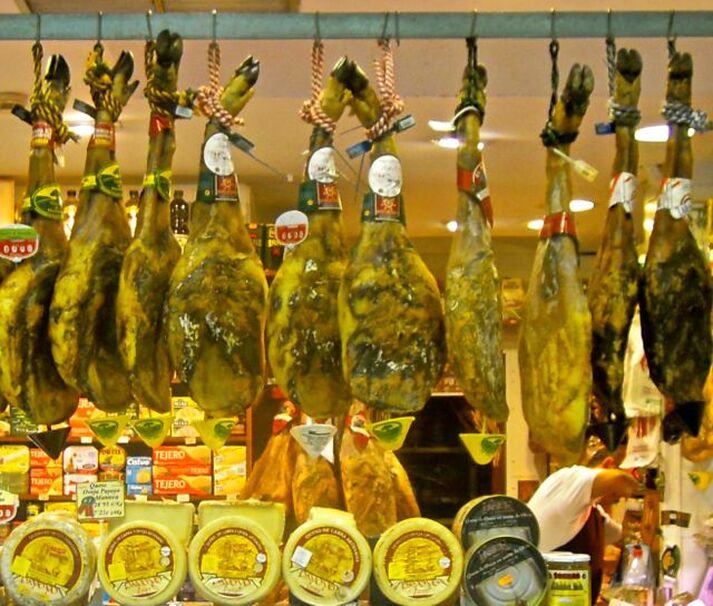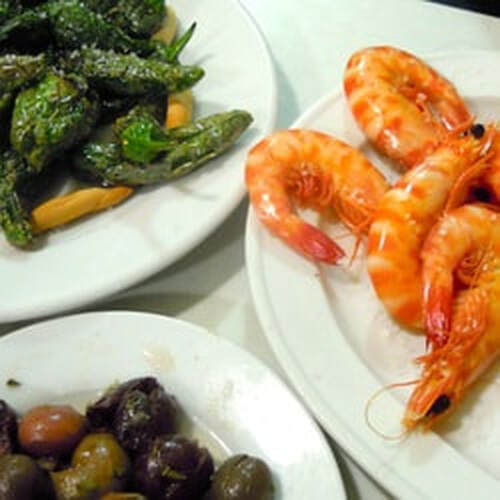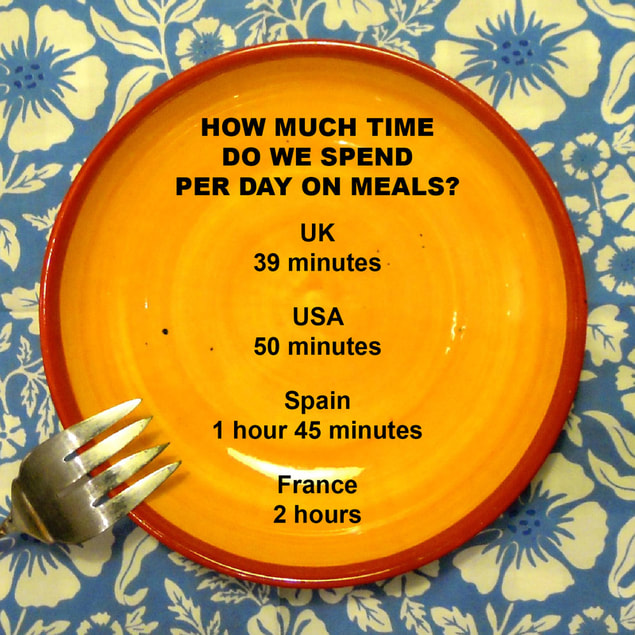|
I’m often gobsmacked by the health advice I’m offered by Spanish health care professionals. High cholesterol? Consume more dark chocolate, red wine, and good Spanish ham. Taking cold medicine? No orange juice for you! Your prescription says avoid alcohol? Oh, go on, two or three beers won’t matter. Obviously, this kind of health advice is easy to follow, and to be honest, I’ve had pretty good results with it so far. My American doctor decided I didn’t need cholesterol medication after all, and I’ve found it is easier to survive a cold sipping the occasional beer instead of guzzling OJ. So when I read recently that Spanish health care experts are recommending five meals a day to stay thin, I went to the kitchen, got a snack, and settled down to give the article proper attention. MujerHoy magazine explained that you need breakfast, mid-morning snack, lunch, mid-afternoon snack, and dinner to avoid overeating at any one meal. “To lose this traditional schedule,” the article warned, “is to throw open the doors to indiscriminate nibbling.” Yikes! Our best bet, it seems, it to spend more time at table, eating slowly in a relaxed manner, so our brains and our bodies have time to appreciate the meal and realize that we’ve consumed enough nutrition to make it through the next few hours until it’s time to eat again. The article reported, in a tone verging on horror, that while the Spanish continue to spend a civilized 1 hour and 45 minutes a day at meals, those crazy Americans allot just 50 minutes daily to the pleasures of the table – which may not involve a table at all, but rather a car, a work station, or even (shudder) walking. I was shocked to discover that Americans aren’t the worst offenders. According to the Daily Mail, in the UK mealtimes account for just 39 minutes and 9 seconds of the average day. Breakfast is a brisk 7 minutes and 20 seconds, “lunch hour” has now been whittled down to a measly 12 minutes and 49 seconds at your desk, and dinner is gulped in just 19 minutes. Not surprisingly, 78% of participants said they wished they could sit down and savor meals longer, and 90% said (rather wistfully, it seemed to me) that on the rare occasions they managed a proper dinner with the family, they enjoyed themselves and wished they could do it more often. The headlong pace of modern living makes it difficult to fit in three meals a day, let alone five. But traveling lets you try all sorts of new things, including ways to fuel body and soul. So you might consider an experiment during your next vacation: try eating more and smaller meals, and lingering at the table as long as possible. When Rich and I were on our recent three month train trip, we generally had five meals a day, making sure we had sufficient morning and afternoon snacks to sustain us during many hours of walking. We sampled plenty of local fare but at other times we opted for simple salads or picnics rather than chowing down on big restaurant meals. We were never hungry and came home leaner than we left. The Spanish aren’t the only ones who have developed the fine art of leisurely meals. The Huffington Post reported that the French spend two hours a day at the table. And according to Mireille Guiliano's bestseller French Women Don’t Get Fat, they're eating all the good stuff we're told to deny ourselves when trying to slim down: chocolate, cheese, meat, bread, even (gasp!) butter. So why don’t they get fat? In large part because les Français take pleasure in three full, leisurely meals every day plus snacks. And they treat food as a friend, rather than an enemy. “French women,” says Guiliano, “think about good things to eat; American women typically worry about bad things to eat.” When I asked a French friend about this over coffee today, she said, “It’s true. We look forward to eating with the same pleasure that we look forward to meeting a good friend.” And that, my friends, seems like something worth doing as often as possible. Bon appétit!
22 Comments
4/17/2014 05:49:17 am
Hi Karen, can we publish this in our newspaper?
Reply
Karen McCann
4/17/2014 09:46:24 am
Sure, Jan; it's always nice to see my work in the Sun. Be sure to add my byline and a link back to the blog page, and let me know when it appears. Glad you like the story!
Reply
4/17/2014 06:43:39 am
When I was recovering from a long siege of chronic fatigue syndrome, back in the 1980s, my naturopath suggested that hypoglycemia (low blood sugar) was part of the problem, and that, to heal this, I needed to eat foods that took 3 hours to digest (fats and proteins) every 3 hours around the clock, until my liver had recovered the ability to time release blood sugar. He didn't have to tell me not to eat too much at any one sitting - I found myself not always wanting to eat, but being obliged to eat, at least a little bit, each time to fulfill my medical regimen. I called it "the Hors D'Oeuvre Diet." Over a period of a year, I not only regained my energy, but I lost an extra 20 pounds I'd been wanting to lose. I certainly wasn't counting calories or carbs.
Reply
Karen McCann
4/17/2014 09:50:37 am
What a perfect case in point, Alicia. I love the idea of the Hors D'Oeuvre Diet. Sounds like the title of a bestselling cook book!
Reply
Karen McCann
4/17/2014 09:51:05 am
Thanks, Susan, glad you liked the piece!
Reply
Sarah
4/17/2014 10:08:37 am
Beautiful! And I think when we actually focus on the food we're bringing into our bodies, it does a "better" job of nourishing us (if such a thing is possible!) Thank you for this post!
Reply
Karen McCann
4/18/2014 02:02:26 am
I believe you're right, Sarah; paying deep attention to the food we eat nourishes us body and soul. Glad you liked the post!
Reply
Jennifer Herrick-Weatherstone
4/17/2014 11:36:14 am
Hi Karen,
Reply
Karen McCann
4/18/2014 02:05:02 am
I'm so glad you enjoyed the piece, Jennifer. And have a wonderful time in Seville next month. Let me know if you need any info, suggestions about tapas bars, etc. And check out the Seville page on my website, which has lots of tips, photos, and trivia about the city: http://www.enjoylivingabroad.com/seville.html
Reply
Tobey Hiller
4/17/2014 12:37:33 pm
Always enjoy your posts, Karen. This is not only probably scientifically accurate, but so intuitively true. As I've grown older, I've resolved into 5 littlest (though dinner is often still substantial) meals a day, often involving protein & carbs and certainly veggies. I've never been overweight, but now that I'm not so active, the benefits are obvious weight-wise--and it's fun! giving the day little luscious breaks. Why is that Europeans seem to have known this all along? . . .
Reply
Karen McCann
4/18/2014 02:07:51 am
Yes, the Europeans seem to grow up knowing this stuff, and we Americans are just learning that food is meant to be a luscious pleasure, not a chore or temptation to be resisted.
Reply
Sharon
4/17/2014 03:04:25 pm
Hi Karen
Reply
Karen McCann
4/18/2014 02:12:52 am
I am so glad you're enjoying the blog posts, Sharon. Your meal schedule sounds like ours; we love to have the main meal in the middle of the day, followed by a siesta, then of course, afternoon snack and a light dinner. It gives a nice rhythm to the day and there's always a pleasant sense of anticipation about the next meal. So much better than inhaling a sandwich at my desk or a double latte in my car and calling that lunch, as I used to do in the US!
Reply
Something often forgotten with regard to the health of spending more time with the ceremony of sitting at the table is that we spend more time together. Communicating and learning. The disconnect and breakdown of society in the UK starts at home. Now squeezed into 39 minutes is our time of knowing about what your kids are doing, your parents think or even horror of horrors 39 minutes away from technology ... it's healthy for our bodies to sit and eat considered food, but for our family and society it's a remedy to the virus that's now in evidence in the news each day.
Reply
Karen McCann
5/1/2014 11:12:22 am
Fiona, thanks for your thoughtful comments. Growing up, I didn't properly appreciate those mandatory family dinners every night, but now, looking back, I can see how valuable they were!
Reply
I like eating smaller meals, more times a day, which is just shocking to my Spanish family. They eat a rather large lunch (first plate, second plate, fruit, dessert, coffee, maybe pastries), accompanied by wine 50% of the time, but that kind of meal makes me feel tired/grumpy. On Sundays when we're headed back to Madrid after a weekend at home, I have to eat very "little" of I'm offered (not so little, relatively speaking) so that I don't feel like shit on the trip home. I don't know if this just reveals how very not Spanish I am or what ...
Reply
Karen McCann
5/1/2014 11:16:02 am
It's never easy adapting to another family's eating schedule, let alone another culture's. No doubt your Spanish family sees giving you food as a form of love, and that makes it hard for them to understand that you're just trying to eat in moderation, as your body wants to consume food.Good luck with this cross-cultural conundrum! I'm sure you'll work it out.
Reply
4/30/2014 03:56:39 pm
I'll be moving to Spain in September to teach English, and I'm really looking forward to the Spanish lifestyle again as I studied in Granada in 2010. I think the point that the Spanish tend to eat longer meals in a relaxed fashion which allows them to notice when they're full is a good one. If I eat fast, I'll eat more then I should. I also think cooking is done with more natural, healthy ingredients in Spain then the more processed ones used in the United States.
Reply
Karen McCann
5/1/2014 11:20:20 am
I do think the Spanish approach to food, especially here in Andalucía, is healthier in a lot of ways. And the fresh ingredients and leisurely pace make it more pleasurable as well. Good luck with your return to Spain! You'll find a bit more fast food here than there was four years ago, but for the most part, the old ways continue on.
Reply
1/9/2019 09:25:20 pm
Love this post, Karen. It is SO true that Americans love their FAST food filled with sugars and unhealthy fats and oils. Learning how to eat like the Europeans do and truly savour the flavour and textures of our food makes us much happier and is better for us, too. And did you know that if you eat a square of pure dark chocolate before a large meal it will actually help with weight management as it helps you feel full faster.
Reply
Karen McCann
1/10/2019 07:16:52 am
Wow, thanks for sharing that little tidbit! I had not heard that a square of pure dark chocolate before a large meal helps you keep your weight down. I will personally test this theory extensively —possibly for the rest of my life! Just one more way that chocolate is a true friend.
Reply
Leave a Reply. |
This blog is a promotion-free zone.
As my regular readers know, I never get free or discounted goods or services for mentioning anything on this blog (or anywhere else). I only write about things I find interesting and/or useful. I'm an American travel writer living in California and Seville, Spain. I travel the world seeking eccentric people, quirky places, and outrageously delicious food so I can have the fun of writing about them here.
My current project is OUT TO LUNCH IN SAN FRANCISCO. Don't miss out! SIGN UP HERE to be notified when I publish new posts. Planning a trip?
Use the search box below to find out about other places I've written about. Winner of the 2023 Firebird Book Award for Travel
#1 Amazon Bestseller in Tourist Destinations, Travel Tips, Gastronomy Essays, and Senior Travel
BLOG ARCHIVES
July 2024
CATEGORIES
All
|












